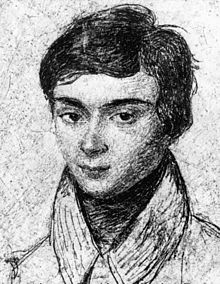Évariste Galois
Appearance

Évariste Galois (October 25, 1811 – May 31, 1832) was a French mathematician, who, while still in his teens, developed the well-known Galois theory. Galois theory is capable to determine whether a polynomial with rational coefficient can be solved by radicals and give a clear insight about what kind of length ratio can be constructed by compass and straightedge, thereby solving the long-standing problems of solving a polynomial by radicals. His life is considered to be one of the most romantic in all of mathematics because of the contributions he has made in such a short span of life.
| This article about a mathematician is a stub. You can help out with Wikiquote by expanding it! |
Quotes
[edit]- ... un auteur ne nuit jamais tant à ses lecteurs que quand il dissimule une difficulté.
- ... an author never does more damage to his readers than when he hides a difficulty.
- in the preface of Deux mémoires d'Analyse pure, October 8, 1831, edited by Jules Tannery (1908). Manuscrits de Évariste Galois. Gauthier-Villars. p. 27.
- Ne pleure pas, Alfred ! J'ai besoin de tout mon courage pour mourir à vingt ans !
- Don't cry, Alfred! I need all my courage to die at twenty.
- Quoted in: Léopold Infeld (1978) Whom the gods love: the story of Évariste Galois. p. 299.
- [This] science is the work of the human mind, which is destined rather to study than to know, to seek the truth rather than to find it.
- Of mathematics — as quoted in Mathematics: The Loss of Certainty (1980) by Morris Kline, p. 99.
Following quotes are reproduced in The mathematical writings of Évariste Galois. (2011, edited by Peter M. Neumann).
- Poisson, reading Galois' First Memoir, found the proof of Lemma III insufficient, and wrote in pencil the following comment.
- La démonstration de ce lemme n’est pas suffisante; mais il est vrai d’après le No . 100 du mémoire de Lagrange, Berlin, 1771. [The proof of this lemma is insufficient; but it is true according to No . 100 of the memoir by Lagrange, Berlin, 1771.]
- It angered Galois sufficiently that he wrote directly below it:
- Nous avons transcrit textuellement la démonstration que nous avons donnée de ce lemme dans un mémoire présenté en 1830. Nous y joignons 154 IV The First Memoir comme document historique le note suivante qu’a cru ^devoir^ y apposer M. Poisson. On jugera. Note de l’auteur [We have faithfully transcribed the proof of this lemma that we have given in a memoir presented in 1830. We append as a historical document the following note which Mr Poisson believed he should add. Posterity will judge. Note by the author]
- Mais je n’ai pas le temps et mes idées ne sont pas encore bien développées sur ce terrain qui est immense. [But I don't have the time and my ideas are not yet well developed on this immense terrain.]
- The Testamentary Letter of 29 May 1832
- Il parait après cela qu'il n'y a aucun fruit à tirer de la solution que nous proposons. [It seems there is no fruit to be drawn from the solution we offer.]
- Page 226, VI.4 Dossier 9: Preliminary discussion, folio 59a.
- Galois was saying that his theory proved that there is no "fruit" of a general solution to the degree-five polynomial.
Quotes about Galois
[edit]- Langlands and Grothendieck are both (at least) Giants by any measure, and both were consciously successors of Galois.
- Michael Harris (18 January 2015). Mathematics without Apologies: Portrait of a Problematic Vocation. Princeton University Press. p. 24. ISBN 978-1-4008-5202-4.
- Since my mathematical youth, I have been under the spell of the classical theory of Galois. This charm has forced me to return to it again and again.
- Mario Livio (19 September 2005). The Equation that Couldn't Be Solved: How Mathematical Genius Discovered the Language of Symmetry. Simon and Schuster. p. 90. ISBN 978-0-7432-7462-3.


